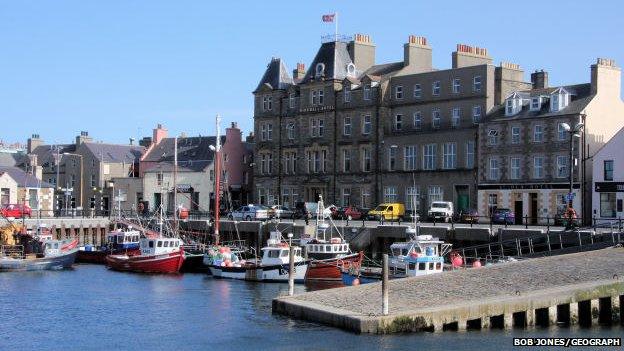Orkney people: study finds strong pre-Viking DNA
- Published

Generations of incomers have arrived in Orkney
A DNA study of Britons has shown that genetically there is not a unique Celtic group of people in the UK.
According to the data, those of Celtic ancestry in Scotland and Cornwall are more similar to the English than they are to other Celtic groups.
The study also describes distinct genetic differences across the UK, which reflect regional identities.
Read BBC Science correspondent Pallab Ghosh on the study here.
As just about anyone in Orkney will tell you, Orcadians are different.
This study underlines that, albeit not in the way they might think.
The authors divided the UK's genetic variations into 17 major clusters. They found the biggest level of variation separated the samples in Orkney from all of the rest.
The Orcadian branch of the tree splits into three distinct clusters, with the island of Westray qualifying for one of its own.
As you might expect, the influence of Norse DNA is strong in all three. But not as strong as you might think.
The paper says Norwegian DNA has contributed to about 25% of Orcadian DNA. What's more, the estimated dates of that contribution coincide with the historical record: it's when the Vikings started to turn their attention to the islands. The authors say that's further validation of their methods.
But the evidence suggests that, for all the cultural power of the islands' Norse heritage, the genetic legacy of Pictish and other pre-Viking DNA remains strong.
Just as important, though, is what this study does not tell us.
We're dealing here with relatively small variations in DNA. They're useful in helping us find major demographic changes through human history. They can also help avoid pitfalls in modern disease studies. But this is not a "racial" map of the UK.
For a start, the sample looked only at middle aged Caucasians, all four of whose grandparents were born within 50 miles of each other. That means, as the authors point out, it looks at genes which were established before the major population movements of 20th century Britain.
There may be no single "Celtic gene" but many scholars have long suggested that Celtic identity is - like Britishness - a cultural construct.
Most of us are happily free to choose the identities we want rather than have one forced upon us. And we can choose multiple identities - European, UK, British, Scottish, Nordic and Orcadian, say - and express them all at the same time if we want.
Meanwhile every one of us remains 100% human.
- Published18 March 2015
